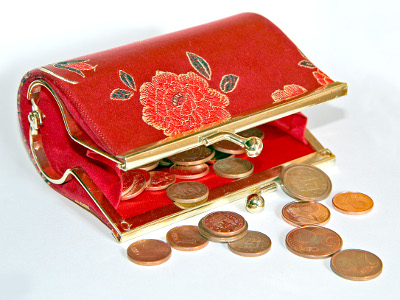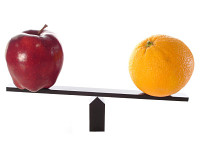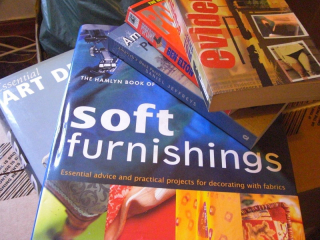Impromptu no spend week
I’ve decided to have an impromptu no-spend week this week. Well, actually, not a no-spend week – a no-spend fortnight-plus, until the end of the year.
No spending days/weeks/months are an often promoted technique by frugal/anti-consumerism people but I’d never really done it before. Many of my days are no spend days, I probably have no spend weeks more often than I think too – it’s not something I’ve felt was an issue I needed to address. But recently, I’ve been buying a few too many (used) books online, or too many (second-hand) things off eBay and I realised I wanted a bit of a self-enforced time out.

Since I’m really wanting to cut down on my frivolous spending not essentials, I’m giving myself five exceptions:
- Food – I’d need to do a lot more planning to avoid spending any money on food for a fortnight (although, to be honest, John pays for most of our food anyway so it’s not something I spend a lot of money on these days). I will try very hard though not to buy any take-out though or pick up a chocolate bar while I’m out and about – only buy food to be prepared at home.
- Food/medical treatment for the animals if needed – definitely an essential not frivolous thing. Although no random ad-hoc treat buying for the cats or dog – they’ve got enough at home already.
- Bills – I think I’ve paid all the automatic direct-debits for the month already but if any are still due from my bank account, they’ll come out anyway.
- Bus fares – necessary for getting about – not that I leave the house much really. Will probably be only a few day riders (at £3.30 a pop) depending on how much I have to go to Bingley for rehearsals over the next few weeks. No taxis home though – I’ll wait for the next bus and/or make sure I get the last one.
- A birthday present for someone because, as usual, I haven’t been organised enough to buy it in advance and avoid having to face Leeds city centre on the run up to Christmas, ugh. I don’t tend to buy birthday presents for people – just give presents at any time when I see something I think people will like/need – but this person is an exception.
My main worry is that I’ll just rely on John to buy me things instead – take-out food or the Saturday newspaper – so I’ll try hard not to do that.
My main temptation will be going to the city centre to buy that birthday present. I’ve not been there for months and probably won’t be going again for a good long while, so the spendaholic devil on my shoulder will tell me to take the opportunity to look in the clothes shops for thick woollies I haven’t been able to find elsewhere or check out what bargain wool is on offer this week in the market. I could use another warm woollie jumper but I don’t need one, and I certainly don’t need any more actual wool. I’m a sucker for non-repeating bargains. Resist! Resist!
The key thing I want to get from it isn’t the desire to never buy anything every again, it’s to make me conscious about when I do spend money.
Have you had a no-spend week/fortnight/month/year before? If so, got any tips to avoid temptation?
Read MoreRealising “Kept for best” is wasteful
Yesterday, our friend Strowger tweeted a link to this article by “essayist and programmer” Paul Graham about “stuff”.
I would urge you to read it if you’ve got five minutes. If you haven’t got five minutes, the message is “stuff, clutter, is bad, m’kay?” but it says it somewhat better than that.
It’s a topic I’ve touched on a few times on this blog – and it’s a concept I believe even if I don’t always live it. But this paragraph leapt out at me:
The worst stuff in this respect may be stuff you don’t use much because it’s too good. Nothing owns you like fragile stuff. For example, the “good china” so many households have, and whose defining quality is not so much that it’s fun to use, but that one must be especially careful not to break it.
Paul Graham on “Stuff“
I think this not only applies to “fragile stuff” but anything that’s “kept for best” or “kept to be enjoyed at a later special time, not now, not all the time”.
We don’t have “good china” or a pristine room solely for entertaining guests. We don’t have a fancy car that we worry about parking it on the street or in bad areas. We don’t really have “Sunday best” clothes – we have items we don’t wear every day, that are a bit smarter, but we don’t wear them because we prefer to wear other things, not because we’re saving them for a special occasion.
But on smaller things, I’m guilty of wasteful behaviour when “keeping stuff for best”.
For example, I frequently delay pleasure to, in theory, enjoy it all the more at the end. Sometimes this pays off: I finish a meal on my favourite bit of it so the taste of the delicious, seasoned meat stays in my mouth rather than the overcooked, watery carrot.
But other times it promotes waste. John gets annoyed when I save a piece of cake or sweets until I really, *really* want it/them – but it goes stale or sticky before that time arrives. Or, slightly different but part of the same thing, a craft project sits half finished forever because I worry I haven’t the skills to complete it PERFECTLY (when I could finish it in a “good enough” way immediately).
It’s funny, I knew I wasted cake sometimes. And I knew exactly why I wasn’t finishing that half-made quilt. But it was only after reading that paragraph that it really drove home to me quite how bad the habit is – how wasteful it is of the world’s resources, of money and of my mental resources.
Definitely something I need to change about myself!
Read MoreWhy I’m trying to stop making comparisons
 Last week, I wrote about how I cut our gas bill in half with just one phone call. Immediately after my phone call, I told a friend about the experience and he expressed surprise about how little gas we use – compared to him (he keeps records like I do) and compared to the national average, a figure he knew off the top of his head. Intrigued, I started looking up more and more information about average consumption figures – the boards at MoneySavingExpert are full of people talking about how much they pay, for what size of a house, and I also found a website which lets you compare your consumption with others locally and nationally, IN GRAPH FORM. (I like graphs.)
Last week, I wrote about how I cut our gas bill in half with just one phone call. Immediately after my phone call, I told a friend about the experience and he expressed surprise about how little gas we use – compared to him (he keeps records like I do) and compared to the national average, a figure he knew off the top of his head. Intrigued, I started looking up more and more information about average consumption figures – the boards at MoneySavingExpert are full of people talking about how much they pay, for what size of a house, and I also found a website which lets you compare your consumption with others locally and nationally, IN GRAPH FORM. (I like graphs.)
But then I stopped. I realised what I was doing. If I’d been doing it a year earlier when we first moved into our new house, I could have pretended I was looking up the info to get an idea how much I’d be paying over the year. But I knew exactly how much I should be paying. I was just doing it to gloat. To feel good about how frugal we are, how green we are, compared to the rest of Mr & Ms UK resident.
I’m terrible at making comparisons to make myself feel better about things. I think it’s partly (mostly?) to do with being insecure and generally having low-self esteem, but another part of it is wanting to proof my deliberately lifestyle decisions are making a difference.
I want to know that someone else spends three, four, five times as much as me on their weekly shop because I grow my own and spend time cooking from scratch to justify my time and energy. I want to hear the person who bought the 42″ plasma tv or the new BMW complain about not having any money at the end of the month, because it justifies my sensible attitude in not buying those things. I want to hear that the person who lives in t-shirt and shorts in the middle of winter is paying multiple-multiple times the amount for heating than woolly-clad me, because it means I can look down on them, on their wastefulness and how they’re SINGLE-HANDEDLY DESTROYING THE PLANET.
I’m not that bad really. But it’s there and it’s destructive.
Read MoreSeeing how it works
 Two of my geeky friends have bought next generation Kindles recently – Amazon’s new version of its ebook reader.
Two of my geeky friends have bought next generation Kindles recently – Amazon’s new version of its ebook reader.
The first friend lives in Belgium but Amazon only ship them to the UK and US, so the friend had his shipped here, and we sent it on. Because of a bit of a delivery hoohah relating to a not-working doorbell, we spent a few days last week negotiating actually getting it into our sticky sticky hands then I had to take it to the post office and wish it bon voyage — more time thinking about it and dealing with it than I’d expected.
The second friend, who bought and broke a Nook (Barnes & Noble’s ebook reader) a few months ago, brought his when he came to stay on Friday night. We ooh-ed and aah-ed at the incredibly readable screen, and were surprised by how slim and light it was.
By coincidence, I’ve been going onto Amazon a lot over the last week – buying some books but also some kitchen items and chasing up a lost jam strainer – and there is a giant ad for the “all new” Kindle on the front page. And every time I see it, I think “ooh”.
I have no interest whatsoever in getting an ebook reader, less than none. The second friend is a contractor and travels around a lot, staying in different places for a few months at a time before moving on. He doesn’t really have a permanent base to store an extensive book collection. We do though, we’re not moving. And I like book-books – the feel of them, the smell of them, the fact they don’t crash, break easily or need upgrading. Some of my books are 50 years old, I’ll still be reading some of my other books in 50 years time.
But I keep seeing this silly gadget everywhere – in my real life and online – and it’s worming its way into my brain. It’s strange to be able to see it so obviously – to see how uninterest can be changed into a desire, into a want, into a need just by repetition and existence in my friendship sphere. I don’t want an ebook reader, I really really don’t, but I can’t stop my brain going “ooh” in recognition.
I feel very conscious of it happening, which makes me worried about the times when I can’t see it happening – or what would happen if I was subject to more advertising or more friends-with-shiny-things on a regular basis. Frightening.
(Photo by nkzs)
Read MoreNew books in, old books out
I went on a bit of a book buying spree one evening last week – a combination of Amazon new & used, and Abebooks. Unusually for me, all of the books were fiction – I think I’m subconsciously preparing for a winter of reading in front of the stove.
Six packages arrived one morning – our poor postman – and to make the most of it, I stretched out opening them over the next few days. I love opening parcels containing brand new books – the flatness of the pages, that fab new book smell – and compared to that, opening new-to-me used books is a more varied, often disappointing experience if the books are in a poorer condition than expected — but that’s usually fleeting and I’d prefer to have cheaper, used books than that new-book experience any day.
When I was talking about the hidden costs of hoarding a few months ago, I decided that I’d have a new policy when it came to buying books to avoid our (extensive) book collection spinning out of control: for every two books I buy, I have to get rid of an existing one.
So I got nine books in and this is my five out:
A couple of old fiction books, a judgemental poor man’s Louis Theroux book about the US, a how-to book on soft furnishings which I bought at the wrong end of my interest in soft furnishings, and a coffee table book on Art Deco artefacts/ornaments.
With Dan’s great suggestion for using Library Thing as a way to remember books rather than keeping the physical copies, I don’t have to worry about forgetting the fiction ones, so all these will be heading off to a charity shop soon!
Read MoreRegifting – do you do it? how do you do it?
The other day, a friend of mine, who wishes to remain anonymous for reasons that may become more apparent later, told me he had spent part of his weekend wrapping Christmas presents. I pulled a WTF face – wrapping Christmas presents? in September?!
He explained that whenever they have to go to the faff of getting the paper, tags, tape etc out to wrap one present, like a birthday present, they wrap a whole bunch of them at the same time to be more efficient. He added that they also have a cunning present recycling strategy.
Whenever the friend and his lady are given birthday/Christmas/random presents they don’t want, they stick a post-it note on it and add it to their to-give present box so it can be regifted in the future without any chance of it ending up back with the original giver.
As I’ve explained before on Recycle This, I’d much rather not get the gifts in the first place and unlike my super nice friend, I’d rather make things a bit awkward than accept the items because I’m uppity and mardy like that – but I think the post-its are a great, simple idea to avoid re-gifting embarrassment.
Do you regift? Or otherwise give gifts of things you already have around your home? Do you have any strategies to avoid giving them back to the giver?
If you’d never regift, why not? How would you feel if you were given something you suspected had been re-gifted? Would you say anything?
Read More




